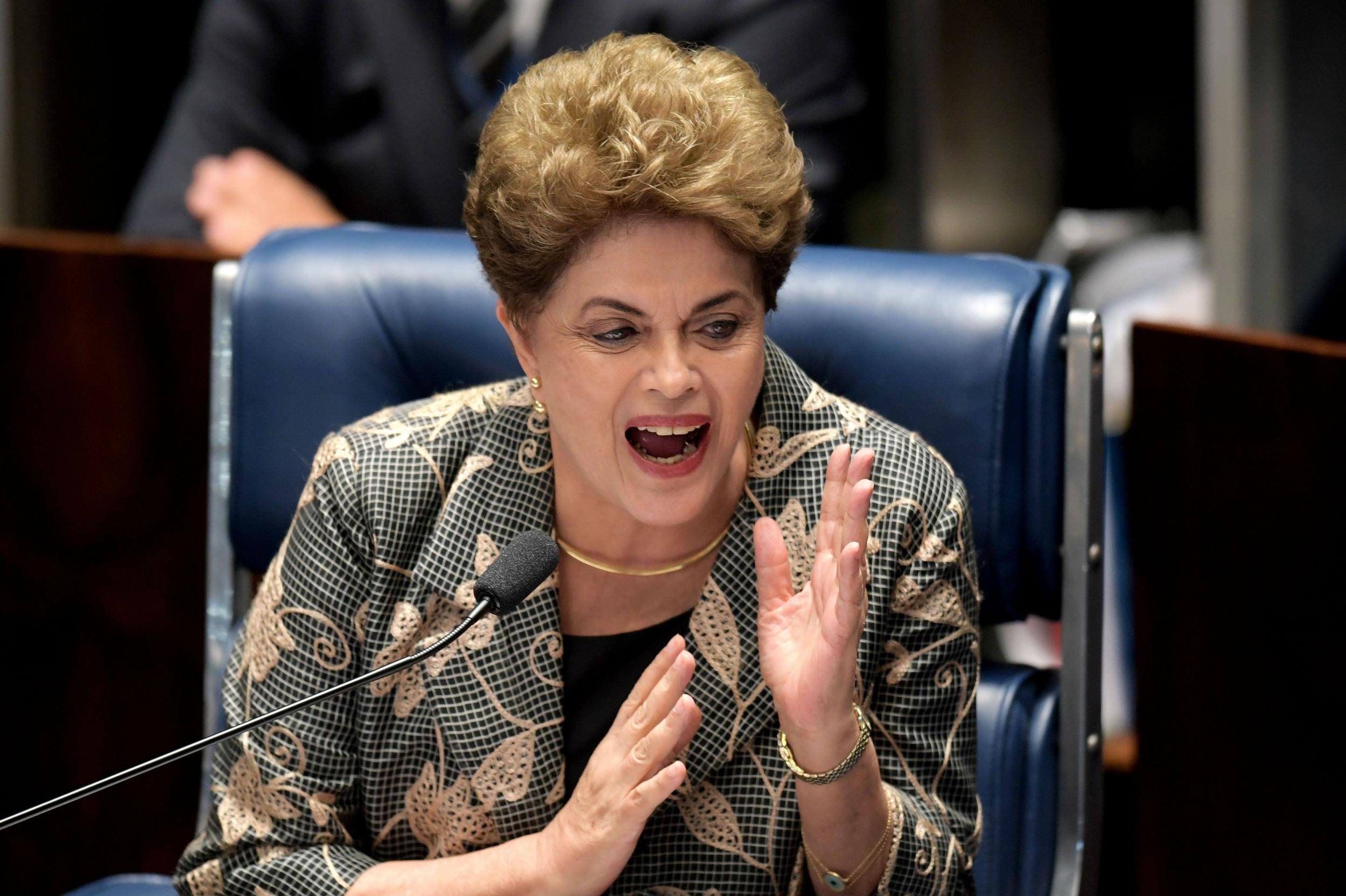Dilma Rousseff says democracy in jeopardy as she fights to get her job back as President of Brazil
Rousseff's hopes of regaining power seem slender

Your support helps us to tell the story
From reproductive rights to climate change to Big Tech, The Independent is on the ground when the story is developing. Whether it's investigating the financials of Elon Musk's pro-Trump PAC or producing our latest documentary, 'The A Word', which shines a light on the American women fighting for reproductive rights, we know how important it is to parse out the facts from the messaging.
At such a critical moment in US history, we need reporters on the ground. Your donation allows us to keep sending journalists to speak to both sides of the story.
The Independent is trusted by Americans across the entire political spectrum. And unlike many other quality news outlets, we choose not to lock Americans out of our reporting and analysis with paywalls. We believe quality journalism should be available to everyone, paid for by those who can afford it.
Your support makes all the difference.Fighting to regain power as President of Brazil, Dilma Rousseff declared, at her impeachment trial in Brasilia, that her conscience was clear. “I did not commit a crime,” she insisted.
The appearance of Ms Rousseff at her trial before members of Brazil’s senate marks the high watermark in a political drama that began in May when she was suspended from office amid charges that she fiddled the country’s books to win election to a second term in 2014.
The chamber will vote later this week on the guilt or innocence of Ms Rousseff. A vote to convict would remove her from office permanently. Brazil's vice-president, Michel Temer, who has been serving as acting president since May, would formally take over as leader of South America’s largest economy.
Few were expecting Ms Rousseff to survive the week. Her conviction would also spell the final upending of almost 15 years of control by her leftist Workers Party, which swept to power in Brazil when President Luiz Inácio Lula da Silva took office in 2003.
“I know I will be judged, but my conscience is clear. I did not commit a crime,” Ms Rousseff said as she delivered a 30-minute speech in the senate on Monday defending her record. Outside hundreds of protestors gathered to decry the process that has hobbled her hold on power.
Noting that she was re-elected in 2014 by 54 million Brazilians, Ms Rousseff acknowledged she has made mistakes. “Like everyone, I have defects and I commit errors. But among my defects is not disloyalty or cowardice,” she said.
But she also issued a dire warning to senators that she considered herself the victim of injustice in the trial, and that the very democratic fabric of the country was under threat because of it.
“Now the only thing I fear is the end of democracy,” she said, reiterating what she has said before – that she cannot “accept a coup”.
Ms Rousseff, 68, has lived in the presidential palace in Brasilia since her suspension, but has otherwise been stripped of all power and privileges. That included her staying away from the Olympic Games in Rio de Janeiro this month, where Mr Temer watched over the opening ceremony instead.
Supporters of the former leftist guerrilla, who fought for democracy during Brazil’s military dictatorship and later became President Lula da Silva’s chief of staff, insisted that the charges laid against her have always been a pretext for removing her from power without an election. Mr Lula da Silva was among Ms Rousseff's supporters crammed in the chamber's public galleries.
“During the fight against dictatorship, my body was marked by torture. I became bitter,” Ms Rousseff noted, her voice cracking sometimes as she spoke. “I can’t help but to again taste the bitterness of injustice and arbitrariness.”

Tape recordings of phone conversations that surfaced soon after her suspension indicated that some of those lawmakers who supported the attempt to remove her were motivated by a desire to impede a sprawling investigation she had helped initiate into political corruption.
“Impartial observers generally recognise that the charges against her are more political than fiscal in nature,” James Green, a professor of Brazilian history and culture at Brown University, said on Monday. “Numerous governors, whose parties are supporting the impeachment, have organised their own states’ public finances in similar ways over the past two decades.”
Mr Temer faced early criticism for forming an all-male, all-white cabinet of ministers, two of whom were quickly forced to resign when they were implicated in the corruption probes.
Although he was Ms Rousseff’s running mate, Mr Temer moved quickly to abandon the leftist programme originally put in place by President Lula da Silva and set Brazil in a new free-market direction.
“Michel Temer, her replacement and vice-presidential running mate from the Party of the Brazilian Democratic Movement, has already reversed all of the policies from their joint electoral platform, turning his back on the 54 million voters who elected Ms Rousseff to a second term in 2014,” Professor Green contended.
Join our commenting forum
Join thought-provoking conversations, follow other Independent readers and see their replies
Comments